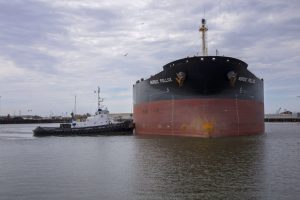Archives
Freight News, Sea
Nordic Pollux is Largest Cargo Ship at the Port of Brownsville
[ February 9, 2018 // Gary G Burrows ]The Port of Brownsville set a record Jan. 31 when it received the M/V Nordic Pollux , the largest cargo vessel to ever call on the port to date.
The big tanker is the size of two-and-a-half football fields and almost longer than the combined height of three Statues of Liberty stacked atop one another, measuring 900 feet long and 157 feet wide – just three feet shy of the width of a football field! It’s the longest and widest ship to call on the Port of Brownsville.
The oil tanker made its way from Philadelphia to Brownsville where it loaded approximately 150,000 barrels of heavy naphtha.
Moving a ship this size into port took an experienced harbor pilot and three powerful Signet Maritime tugboats to precisely maneuver the behemoth vessel into place, bumping, pushing and pulling the Nordic Pollux to the Port of Brownsville’s Liquid Cargo Dock 5.
The Brazos Santiago Pilots safely navigated the ship along the port’s 17-mile-long channel and expertly rotated the tanker in the channel turning basin, with all three tugs working in careful unison.
The growing trend of larger ships in the international maritime fleet is influencing big changes in shipping industry infrastructure, like the recent expansion of the Panama Canal and enhanced port infrastructure around the world – including improvements at the Port of Brownsville. The port is building bigger and deeper berths and plans to deepen its ship channel to 52 feet from its current design depth of 42 feet, making the Port of Brownsville among the deepest ports in the Gulf of Mexico upon completion.
Completion of the port’s channel deepening project allows it to accommodate deeper draft cargo ships, making visits by ships like the Nordic Pollux a more common sight. Bigger ships not only mean more cargo, it means more jobs to move cargo on and off the giant vessels.
The Port of Brownsville’s channel deepening project received Congressional authorization in late-2016 and it is currently in the permitting stage.
Tags: Port of Brownsville












